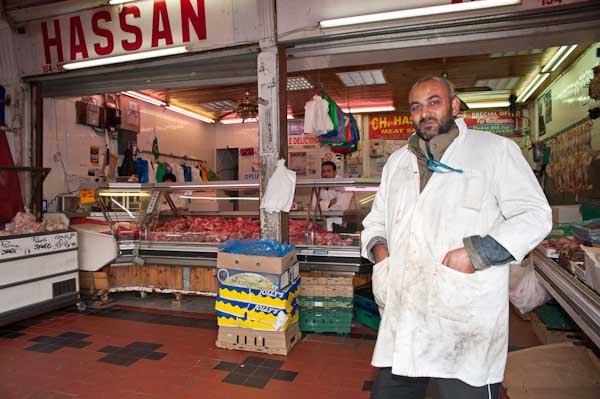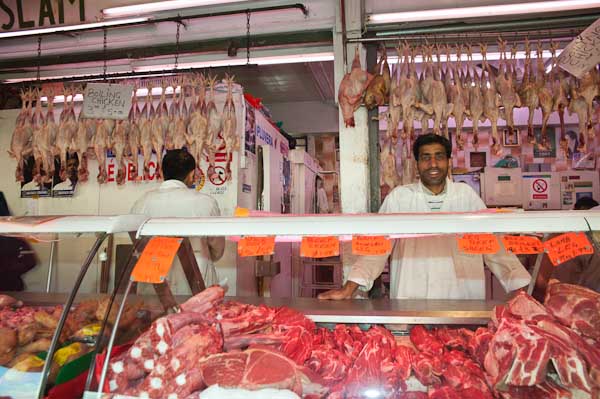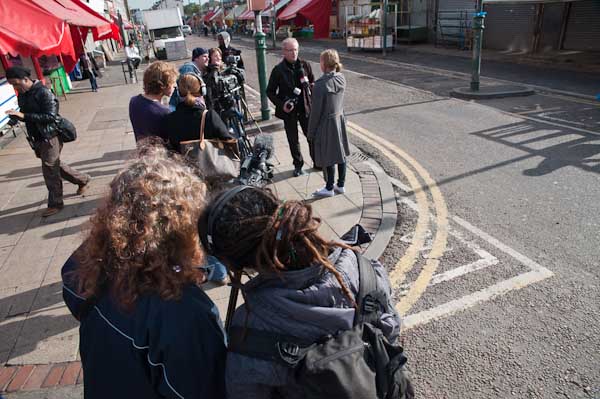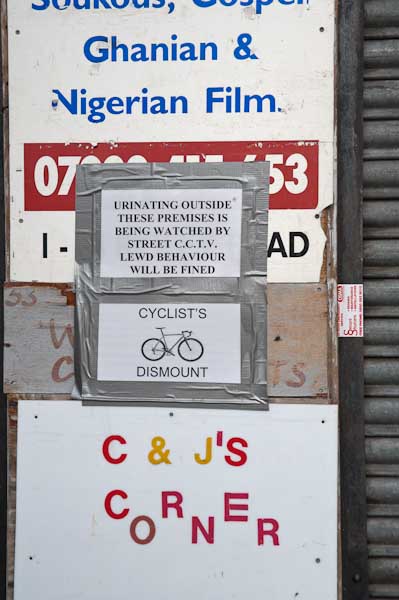Worldwrite is a Hackney education charity which teaches youths how to make film, putting out the efforts made by 16-25 year olds on the web as an alternative news channel, Worldbytes.org, and increasingly they are running into the same problems many of us face when taking photographs on the street.
Under English law, photography and filming is allowed in public places. You don’t need to get anyone’s permission or a licence to film on the streets, but more and more some people are taking it into their hands to try and stop it happening. As Worldwrite say: “we are finding it increasingly difficult to film in public places in Hackney: security guards, community wardens and self-appointed ‘jobsworths’ are refusing us ‘permission’ to film on many of our streets.”
On Sunday 18 October, Worldbytes visited several of what they call ‘film-free places‘ in Hackney where their crews have run into difficulties and photographing to make a film about the problem, coming as a group to challenge these attempts to restrict our freedom, talking and interviewing people and handing out fliers explaining what they were doing and why.

I met them at Ridley Road Market in Dalston, where I’ve photographed a few times over the years. Its one of London’s more interesting and multicultural markets, and there are always some interesting people on both sides of the stalls. I’ve had no problems there in the past, though there have been a few things I’ve decided it wouldn’t be wise to try and photograph. But Worldbytes crews have been told they can’t film there, not by the stall holders or other market users, but by employees of Hackney Council.
Worldbytes had issued an invitation for photographers and film-makers to go along and take pictures in support of their protest, and so I did. After talking to them, I decided to walk along the market and see if anyone working there objected to me taking pictures. Or indeed if council employees tried to stop me.
I took some general views without asking anyone for permission, but as usual, where I wanted to take pictures including stallholders or other people I asked if I might. Not because I need to, but out of politeness, and I shrugged my shoulders and moved on if they refused. Of course at times I photograph people who don’t want to be photographed, but this wasn’t appropriate here.

As I was using flash most of the time, it was clear that I was taking pictures and some people asked me to photograph them who I might otherwise have walked by. At one place I did stop to argue after having been refused – and eventually managed to get permission to take a picture; at another I got profuse apologies from an employee who was obviously sorry that the stall owner had decided not to cooperate with Worldbytes.
After around 20 minutes taking pictures I was asked if I would do an interview for the programme Worldbytes crews were making about the right to film, and although I much prefer to stay behind a camera I agreed. Though I do hope that my contribution is going to end up on the cutting room floor.

The council employees didn’t turn up to stop filming while I was there; probably Sunday is their day off. But it’s very hard to understand why Hackney Council should allow or instruct their employees in this way. They should know the law after all.
From what I was told it appears to be a case of misguided zeal around concerns about children and vulnerable adults, but the law is clear. As the Worldbytes flier put it:
There is in fact NO LAW against filming or taking photographs in public places and permission or a licence is NOT required for gathering news for news programmes in public spaces.

Contrary to what many people think – possibly including Hackney Council – you don’t need permission to photograph children, though now even being seen with a camera anywhere near them arouses suspicion. Cartier-Bresson wouldn’t now get away with his great image of a boy on a street corner proudly bringing home the bread and wine without being attacked by vigilantes or questioned by the authorities and getting on the sex-offender’s register. Of course there are good reasons to be very careful when approaching children, and often photographers will now want to have the permission of the responsible adults, but it isn’t an offence and should not cause any problems to take pictures of normal activities in public, for example of children accompanied by their parents shopping in a market.
Some areas of the market may be privately owned, as increasingly is the case with public places, even those where the public has more or less unrestricted access. Canary Wharf, where photographers held a protest against restrictions on photography last month, is an prime example, along with most shopping centres. In these privately owned places the owners can make their own rules, and usually ban photography, though amateurs and tourists may be tolerated.
But the problems photographers face in most public places are linked to the current paranoia over terrorism, which has been pandered to by parliament with panic-driven legislation and by the police with advertising posters that suggested that a camera is a terrorist weapon. But even parliaments misplaced zeal looks almost reasonable when you look at the way these laws have been misapplied by police and public employees.
Laws meant to deal with terrorists have been used against peaceful protesters, against innocent tourists and against photographers. The police did get a small rap across the knuckles from the Home Office in a recent circular which reminded them that they should only use the terrorist legislation where there is a reasonable suspicion of terrorism, and it is clearly time that councils and other employers attempted to teach reason to their staff as well.
The last thing that would-be terrorists are likely to do is to walk around their prospective target areas with large cameras and tripods, making themselves obvious. They are unlikely to take photographs at all, but should they choose to do so, their most likely tool is a camera phone and they will definitely not want to be seen as photographers. In most cases the visual information already readily available from on-line high-resolution satellite photography or Google’s Street View is likely to be of more use.
Photography and film are important media of visual expression, and the freedom to take pictures, especially about the society in which we live, is a vital part of the freedom of expression that makes our society a free society and we all need to be vigilant to keep it free.
Edited versions of this post have appeared on Demotix and Indymedia. More pictures from Ridley Road on My London Diary.
One thought on “Worldbytes Defend the Freedom to Film”